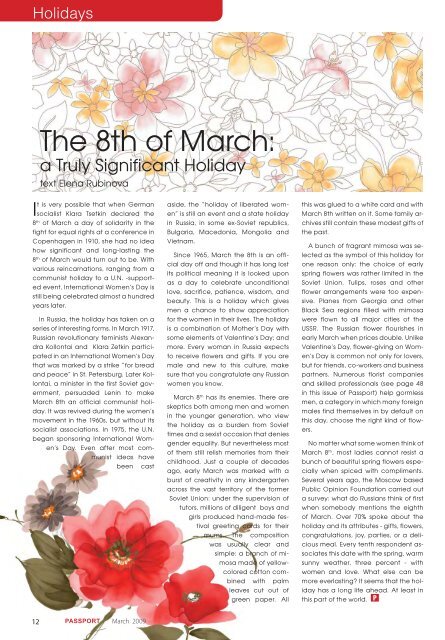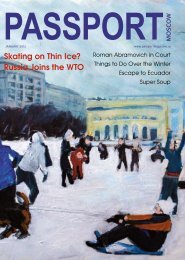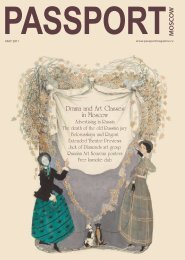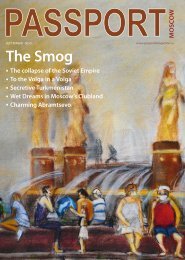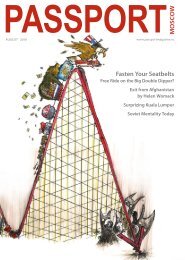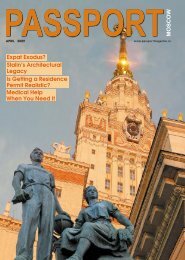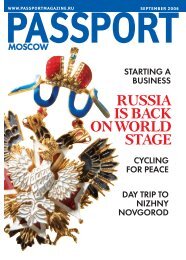A Truly Significant Holiday - Passport magazine
A Truly Significant Holiday - Passport magazine
A Truly Significant Holiday - Passport magazine
Create successful ePaper yourself
Turn your PDF publications into a flip-book with our unique Google optimized e-Paper software.
<strong>Holiday</strong>s<br />
It is very possible that when German<br />
socialist Klara Tsetkin declared the<br />
8th of March a day of solidarity in the<br />
fight for equal rights at a conference in<br />
Copenhagen in 1910, she had no idea<br />
how significant and long-lasting the<br />
8th of March would turn out to be. With<br />
various reincarnations, ranging from a<br />
communist holiday to a U.N. -supported<br />
event, International Women’s Day is<br />
still being celebrated almost a hundred<br />
years later.<br />
In Russia, the holiday has taken on a<br />
series of interesting forms. In March 1917,<br />
Russian revolutionary feminists Alexandra<br />
Kollontai and Klara Zetkin participated<br />
in an International Women’s Day<br />
that was marked by a strike “for bread<br />
and peace” in St. Petersburg. Later Kollontai,<br />
a minister in the first Soviet government,<br />
persuaded Lenin to make<br />
March 8th an official communist holiday.<br />
It was revived during the women’s<br />
movement in the 1960s, but without its<br />
socialist associations. In 1975, the U.N.<br />
began sponsoring International Women’s<br />
Day. Even after most communist<br />
ideas have<br />
been cast<br />
12<br />
The 8th of March:<br />
a <strong>Truly</strong> <strong>Significant</strong> <strong>Holiday</strong><br />
text Elena Rubinova<br />
March 2009<br />
aside, the “holiday of liberated women”<br />
is still an event and a state holiday<br />
in Russia, in some ex-Soviet republics,<br />
Bulgaria, Macedonia, Mongolia and<br />
Vietnam.<br />
Since 1965, March the 8th is an official<br />
day off and though it has long lost<br />
its political meaning it is looked upon<br />
as a day to celebrate unconditional<br />
love, sacrifice, patience, wisdom, and<br />
beauty. This is a holiday which gives<br />
men a chance to show appreciation<br />
for the women in their lives. The holiday<br />
is a combination of Mother’s Day with<br />
some elements of Valentine’s Day; and<br />
more. Every woman in Russia expects<br />
to receive flowers and gifts. If you are<br />
male and new to this culture, make<br />
sure that you congratulate any Russian<br />
women you know.<br />
March 8th has its enemies. There are<br />
skeptics both among men and women<br />
in the younger generation, who view<br />
the holiday as a burden from Soviet<br />
times and a sexist occasion that denies<br />
gender equality. But nevertheless most<br />
of them still relish memories from their<br />
childhood. Just a couple of decades<br />
ago, early March was marked with a<br />
burst of creativity in any kindergarten<br />
across the vast territory of the former<br />
Soviet Union: under the supervision of<br />
tutors, millions of diligent boys and<br />
girls produced hand-made festival<br />
greeting cards for their<br />
mums. The composition<br />
was usually clear and<br />
simple: a branch of mimosa<br />
made of yellowcolored<br />
cotton combined<br />
with palm<br />
leaves cut out of<br />
green paper. All<br />
this was glued to a white card and with<br />
March 8th written on it. Some family archives<br />
still contain these modest gifts of<br />
the past.<br />
A bunch of fragrant mimosa was selected<br />
as the symbol of this holiday for<br />
one reason only: the choice of early<br />
spring flowers was rather limited in the<br />
Soviet Union. Tulips, roses and other<br />
flower arrangements were too expensive.<br />
Planes from Georgia and other<br />
Black Sea regions filled with mimosa<br />
were flown to all major cities of the<br />
USSR. The Russian flower flourishes in<br />
early March when prices double. Unlike<br />
Valentine’s Day, flower-giving on Women’s<br />
Day is common not only for lovers,<br />
but for friends, co-workers and business<br />
partners. Numerous florist companies<br />
and skilled professionals (see page 48<br />
in this issue of <strong>Passport</strong>) help gormless<br />
men, a category in which many foreign<br />
males find themselves in by default on<br />
this day, choose the right kind of flowers.<br />
No matter what some women think of<br />
March 8th , most ladies cannot resist a<br />
bunch of beautiful spring flowers especially<br />
when spiced with compliments.<br />
Several years ago, the Moscow based<br />
Public Opinion Foundation carried out<br />
a survey: what do Russians think of first<br />
when somebody mentions the eighth<br />
of March. Over 70% spoke about the<br />
holiday and its attributes - gifts, flowers,<br />
congratulations, joy, parties, or a delicious<br />
meal. Every tenth respondent associates<br />
this date with the spring, warm<br />
sunny weather, three percent - with<br />
women and love. What else can be<br />
more everlasting? It seems that the holiday<br />
has a long life ahead. At least in<br />
this part of the world. P


